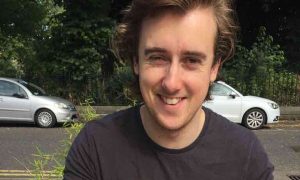Congratulations to Harry Carr on being awarded Runner Up for the Zeshan Qureshi Award for Outstanding Achievement in Medical Education.

Medical Education for me has been primarily about developing new, innovative ways to deliver and improve the quality of teaching for students. I choose not to focus my attention on general clinical teaching, for which we have an excellent MedEdSoc in Newcastle, but to approach those facets which are underserved and/or poorly taught. In 1st year where I used my neuroanatomical knowledge (previous MSc Clinical Neuroscience) to develop hands-on revision sessions using the array of neuroanatomical specimens in the Newcastle DR. That year, I also led the development of the Newcastle ‘PDS Bible’ a document summarising all the key psychosocial concepts for 1st/2nd year students. This document is still being used by junior medical students to date.
Over the ensuing two years, I established myself within Newcastle University Neurological Society (NUNS) (Treasurer, then President) and Newcastle University Surgical Society (NUSS) (Talks Officer). Within NUSS, I organised a 9-part talks series, inviting a surgeon to discuss the myths surrounding their specialty, whether they are true or not and if they are, how they believe we can overcome them. This series was very well received, rated +9.5/10 by attendees. Additionally, I contributed to the NUSS x RCSEd Careers Roadshow and the annual surgical conference.
Within NUNS, I played a pivotal role in the organisation of 2 annual conferences highlights being our ‘egg shell craniotomy’ workshop and the Phantom Limb Pain (PLP) Seminar where we invited an orthopaedic surgeon, pain physician and a patient to discuss their personal experiences of PLP. The format was so well received by both audience and speakers that we are currently planning to expand the format to the wider scientific/medical audience and the lay public. Earlier this year we ran the first Newcastle Spinal Surgery Symposium where we pit a neurological and an orthopaedic spinal surgeon against each other in a head to head ‘battle of the specialties’. The goal was to address why we need two types of spinal surgeon, when they work apart and when they collaborate.
In February 2019, I established the British Undergraduate Space, Extreme Environment & Engineering Medicine Association (BUSEMA) (www.busema.co.uk), the first National student-led medical society dedicated to engaging with all students wishing to explore a career in this niche. Thus far we have ran our first practical workshop at the Kielder Observatory and have established student representatives at 5 medical schools across the UK. In 2020 we have our second observatory event, a star-gazing workshop, and a 1-day symposium covering our 5 pillars – space, altitude, depth, temperature and engineering.
This year, I was appointed as President of the MedAll National Student Committee. Over the 3 months thus far, we have run 3 demystifying portfolios talks, an ‘electives evening’ where we provided 6 talks from current 5th year students (ranging from high-risk countries to teaching and research opportunities to how much it is really going to cost) as well as linking current 4th years with 5th years specific to their destination. In Spring 2020, we will launch the National MedAll AFP day. This will be a completely free event for anyone interested in pursuing academic medicine as a career. In this session, we aim to not only equip our delegates with a solid understanding of what the AFP entails and how to win a spot, but also develop their academic skills. I am also mentoring an aspiring medical student within the social Mobility Foundation (SMF). What I most enjoy about this is the 1-1 nature of the mentoring role. I have previously supported students as part of a one-day ‘how to get into medical school’ event however it is a more involved and personal mentor-mentee relationship working with a single student. I have thus far guided the student through the application process and will be running a mock MMI interview in February.
Finally, I am most proud of my recent and ongoing project. I have found it dissatisfying that the quality of undergraduate surgical education is highly variable across the country. This phenomenon is also present overseas, particularly in resource-limited countries. As part of my elective this summer and in collaboration with NUSS, I established the 1st student-led international surgical skills initiative, the Tanzanian Surgical Skills Project (TSSP) (www.thetssp.org). The aim of the TSSP is to support any Tanzanian student interested in surgery with a view to replicating the opportunities we have here in Newcastle and setting up a lasting collaborative link between students. With support from a number of bodies (https://www.thetssp.org/collaborators), we ran 6 basic surgical skills courses covering knot-tying, suturing and basic laparoscopy for over 65 Tanzanian students. Looking ahead, we have recruited and trained 7 medical students keen to continue this project between March and August 2020 and we are looking to expand outwards from Tanzania into the surrounding continent by working with other surgical societies around the UK and with the support of the Royal College of Surgeons.
As part of the TSSP, we also ran two small-group essential academic skills seminars covering the basics of clinical audit/research. From these, we developed a collaborative MedEd research project assessing the utility of MRI/CT-scan derived 3D-Printed models in the context of student anatomy learning. The project involved working with a large international team of students, academics, clinicians and administrative staff at both Newcastle and KCMUCo and it was a great challenge to coordinate all these individuals. We successfully completed the pilot study at the end of the elective period with the full studies taking place at both sites in 2020/2021.
As part of this project, I am on the M3dicube (www.m3dicube.co.uk) committee, a student and junior doctor-driven interest group that aims to engage UK students in the medical 3D-printing world via ‘scan-model’ workshops, facilitating research projects and designing models for use in simulations, such as our most recent femur fracture repair workshop and our upcoming, ‘paint-a-brain’ neuroanatomy revision session where we will be combining cadaveric specimens with 3D-printed models to provide a comprehensive revision session of gross neuroanatomy to 1st and 2nd year students. Word Count – 994
